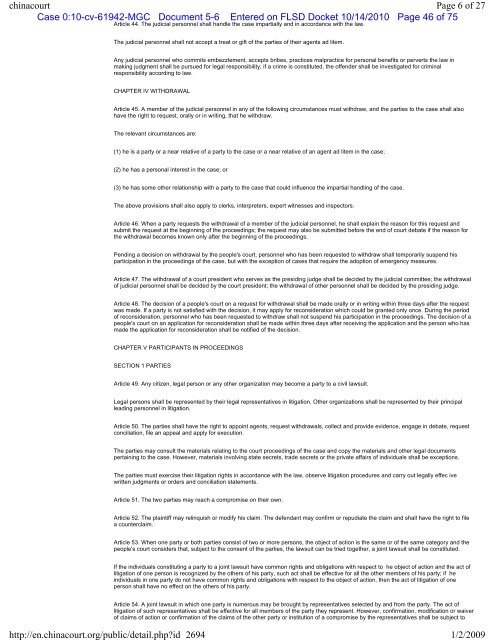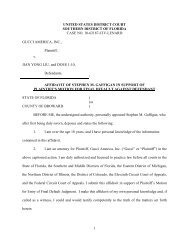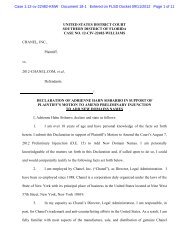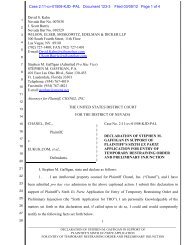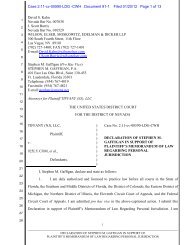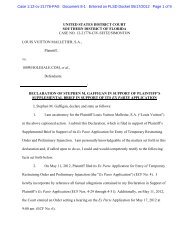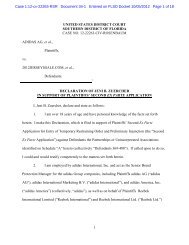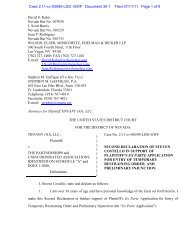UNITED STATES DISTRICT COURT SOUTHERN DISTRICT OF ...
UNITED STATES DISTRICT COURT SOUTHERN DISTRICT OF ...
UNITED STATES DISTRICT COURT SOUTHERN DISTRICT OF ...
You also want an ePaper? Increase the reach of your titles
YUMPU automatically turns print PDFs into web optimized ePapers that Google loves.
Case 0:10-cv-61942-MGC Document 5-6 Entered on FLSD Docket 10/14/2010 Page 46 of 75<br />
Article 44. The judicial personnel shall handle the case impartially and in accordance with the law.<br />
The judicial personnel shall not accept a treat or gift of the parties of their agents ad litem.<br />
Any judicial personnel who commits embezzlement, accepts bribes, practices malpractice for personal benefits or perverts the law in<br />
making judgment shall be pursued for legal responsibility; if a crime is constituted, the offender shall be investigated for criminal<br />
responsibility according to law.<br />
CHAPTER IV WITHDRAWAL<br />
Article 45. A member of the judicial personnel in any of the following circumstances must withdraw, and the parties to the case shall also<br />
have the right to request, orally or in writing, that he withdraw.<br />
The relevant circumstances are:<br />
(1) he is a party or a near relative of a party to the case or a near relative of an agent ad litem in the case;<br />
(2) he has a personal interest in the case; or<br />
(3) he has some other relationship with a party to the case that could influence the impartial handling of the case.<br />
The above provisions shall also apply to clerks, interpreters, expert witnesses and inspectors.<br />
Article 46. When a party requests the withdrawal of a member of the judicial personnel, he shall explain the reason for this request and<br />
submit the request at the beginning of the proceedings; the request may also be submitted before the end of court debate if the reason for<br />
the withdrawal becomes known only after the beginning of the proceedings.<br />
Pending a decision on withdrawal by the people's court, personnel who has been requested to withdraw shall temporarily suspend his<br />
participation in the proceedings of the case, but with the exception of cases that require the adoption of emergency measures.<br />
Article 47. The withdrawal of a court president who serves as the presiding judge shall be decided by the judicial committee; the withdrawal<br />
of judicial personnel shall be decided by the court president; the withdrawal of other personnel shall be decided by the presiding judge.<br />
Article 48. The decision of a people's court on a request for withdrawal shall be made orally or in writing within three days after the request<br />
was made. If a party is not satisfied with the decision, it may apply for reconsideration which could be granted only once. During the period<br />
of reconsideration, personnel who has been requested to withdraw shall not suspend his participation in the proceedings. The decision of a<br />
people's court on an application for reconsideration shall be made within three days after receiving the application and the person who has<br />
made the application for reconsideration shall be notified of the decision.<br />
CHAPTER V PARTICIPANTS IN PROCEEDINGS<br />
SECTION 1 PARTIES<br />
Article 49. Any citizen, legal person or any other organization may become a party to a civil lawsuit.<br />
Legal persons shall be represented by their legal representatives in litigation. Other organizations shall be represented by their principal<br />
leading personnel in litigation.<br />
Article 50. The parties shall have the right to appoint agents, request withdrawals, collect and provide evidence, engage in debate, request<br />
conciliation, file an appeal and apply for execution.<br />
The parties may consult the materials relating to the court proceedings of the case and copy the materials and other legal documents<br />
pertaining to the case. However, materials involving state secrets, trade secrets or the private affairs of individuals shall be exceptions.<br />
The parties must exercise their litigation rights in accordance with the law, observe litigation procedures and carry out legally effec ive<br />
written judgments or orders and conciliation statements.<br />
Article 51. The two parties may reach a compromise on their own.<br />
<br />
Article 52. The plaintiff may relinquish or modify his claim. The defendant may confirm or repudiate the claim and shall have the right to file<br />
a counterclaim.<br />
Article 53. When one party or both parties consist of two or more persons, the object of action is the same or of the same category and the<br />
people's court considers that, subject to the consent of the parties, the lawsuit can be tried together, a joint lawsuit shall be constituted.<br />
If the individuals constituting a party to a joint lawsuit have common rights and obligations with respect to he object of action and the act of<br />
litigation of one person is recognized by the others of his party, such act shall be effective for all the other members of his party; if he<br />
individuals in one party do not have common rights and obligations with respect to the object of action, then the act of litigation of one<br />
person shall have no effect on the others of his party.<br />
Article 54. A joint lawsuit in which one party is numerous may be brought by representatives selected by and from the party. The act of<br />
litigation of such representatives shall be effective for all members of the party they represent. However, confirmation, modification or waiver<br />
of claims of action or confirmation of the claims of the other party or institution of a compromise by the representatives shall be subject to


